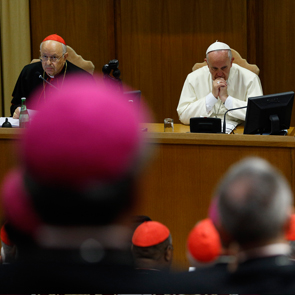The Vatican has instructed all bishops’ conferences to initiate wide-ranging consultations and discussions on matters arising from October’s Extraordinary Synod on the Family, in preparation for the Ordinary Synod that will take place in October 2015.
The Office for the Synod of Bishops that issued the instruction contains 46 questions that will guide an “in-depth examination” of the work begun at October's Extraordinary Synod.
The questions are designed, the bishops are told, to help them avoid “a formulation of pastoral care based simply on an application of doctrine”, as this might not “respect the conclusions of the Extraordinary Synodal Assembly” and risked leading to a “reflection far from the path already indicated”.
The task now, the instruction says, quoting from the final document of the October Synod, is to “re-think … what revelation, transmitted in the Church's faith, tells us about the beauty, the role and the dignity of the family”.
“All levels” of the Church must be involved, the instruction stipulates, including “academic institutions, lay movements and other ecclesial associations”.
"Every effort should be made not to begin anew, but to continue on the path undertaken in the Extraordinary Synod as a point of departure,” the instruction states. The pastoral approach already established in October must guide all future deliberations, it says, providing “concrete instances” arising from “specific situations”.
The instruction quotes extensively from Pope Francis’ apostolic exhortation, Evangelii Gaudium (The Joy of the Gospel), mentioning specifically the exhortation’s emphasis on mercy and journeying to the peripheries of society.
“How can people be helped to understand that no one is beyond the mercy of God and how can this truth be expressed in the Church’s pastoral activity towards families, especially those that are wounded and fragile?” is one of the questions asked, according to a translation reported by Joshua McElwee of the US-based National Catholic Reporter.
Another question asks: “Is the Christian community in a position to undertake the care of all wounded families so that they can experience the Father’s mercy?
How does the Christian community engage in removing the social and economic factors that often determine this situation?”
Bishops are instructed to study further pastoral practice concerning the sacraments with regard to the divorced and remarried, including an assessment of the Orthodox practice (where communion is not withheld on the grounds of a remarriage) and taking into account “the distinction between an objective sinful situation and extenuating circumstances”.
On the Church’s attitude to people who are gay, the instruction asks, “How can the Christian community give pastoral attention to families with persons with homosexual tendencies? … What are the responses that, in light of cultural sensitivities, are considered to be most appropriate?”
It also invites discussion on Pope Paul VI’s 1968 encyclical Humanae Vitae that prohibited artificial contraception.
As well as asking how the Church might provide “pastoral care” to those living together outside of marriage it asks: “What is being done to demonstrate the greatness and beauty of the gift of indissolubility so as to prompt a desire to live it and strengthen it more and more?” and “How can people be made to understand that Christian marriage corresponds to the original plan of God and, thus, one of fulfilment and not confinement?”
Above: The synod's general secretary, Cardinal Lorenzo Baldisseri, and the Pope address bishops at the start of October's Synod. Photo: CNS




 Loading ...
Loading ...